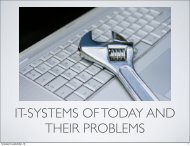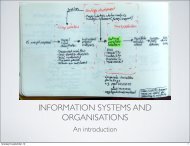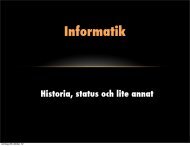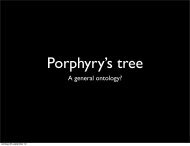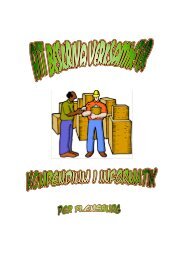Flensburg P: Personlig databehandling - Per Flensburgs hemsida
Flensburg P: Personlig databehandling - Per Flensburgs hemsida
Flensburg P: Personlig databehandling - Per Flensburgs hemsida
Create successful ePaper yourself
Turn your PDF publications into a flip-book with our unique Google optimized e-Paper software.
<strong>Per</strong> <strong>Flensburg</strong>: <strong><strong>Per</strong>sonlig</strong> <strong>databehandling</strong><br />
common patterns emerged, and hypotheses were formulated (section 7.4.1). What<br />
remains is designing experiments or investigations in order to verify or falsify them.<br />
Since the interviews were quite free (rather conversations), I hope the most important<br />
effects and experiences from the users' point of view, have emerged. However,<br />
people saw me as a computer expert and they often thought I required certain answers.<br />
In such cases they often unconsciously gave me just these answers.<br />
Another important question is how do I know that my six main areas (p 191) are the<br />
important ones. They are only a structure. I tried to collect and report the data in<br />
such a way that I was not restricted to these areas. But of course you cannot get answers<br />
to questions not asked. Other types of investigations must thus supplement this<br />
investigation.<br />
I have considered individuals all the time, not organizations. This orientation is perhaps<br />
disadvantageous but my reason is I think not many investigations that have<br />
been undertaken from the individual perspective. It is, however, possible to compare<br />
people working in the same organization and perhaps find some common patterns<br />
due to organizational factors.<br />
7.4 The action oriented approach<br />
The case studies describe the phenomena of user development from the observer’s<br />
point of view. They do not provide any inside or in depth knowledge of effects that<br />
might occur during the implementation of user development in an organization. I<br />
think that process too must be documented, in order to avoid pitfalls and to gain<br />
knowledge about the user development process. The question for whom I gather this<br />
knowledge and which Nissen (1984) discusses, is in this case a very important question.<br />
In the case study part of the project, I achieve a rather generalized knowledge.<br />
In the second part of the project, which I call the action oriented approach; my role as<br />
a researcher is not so clear-cut. I can choose the role of an observer only and document<br />
what happens without any intervention. This is suitable when I know nothing<br />
about the problem. But in this case I do. I have gained some knowledge from the case<br />
study part of the project and I have a strong belief that the users ought to have great<br />
influence. I believe it is wrong and ethically unacceptable to act only as an observer<br />
and not try to help people involved in the development.<br />
The possibilities for achieving generalised results are almost zero, but the possibilities<br />
of achieving valuable knowledge for the people involved in the project are enormous!<br />
I try to act as a change agent and obtain acceptance for the idea of user developed<br />
support systems in the organisation. Often I feel like a salesman of ideas. I believe my<br />
ideas to be good for the organisation, but cannot prove it.<br />
193



